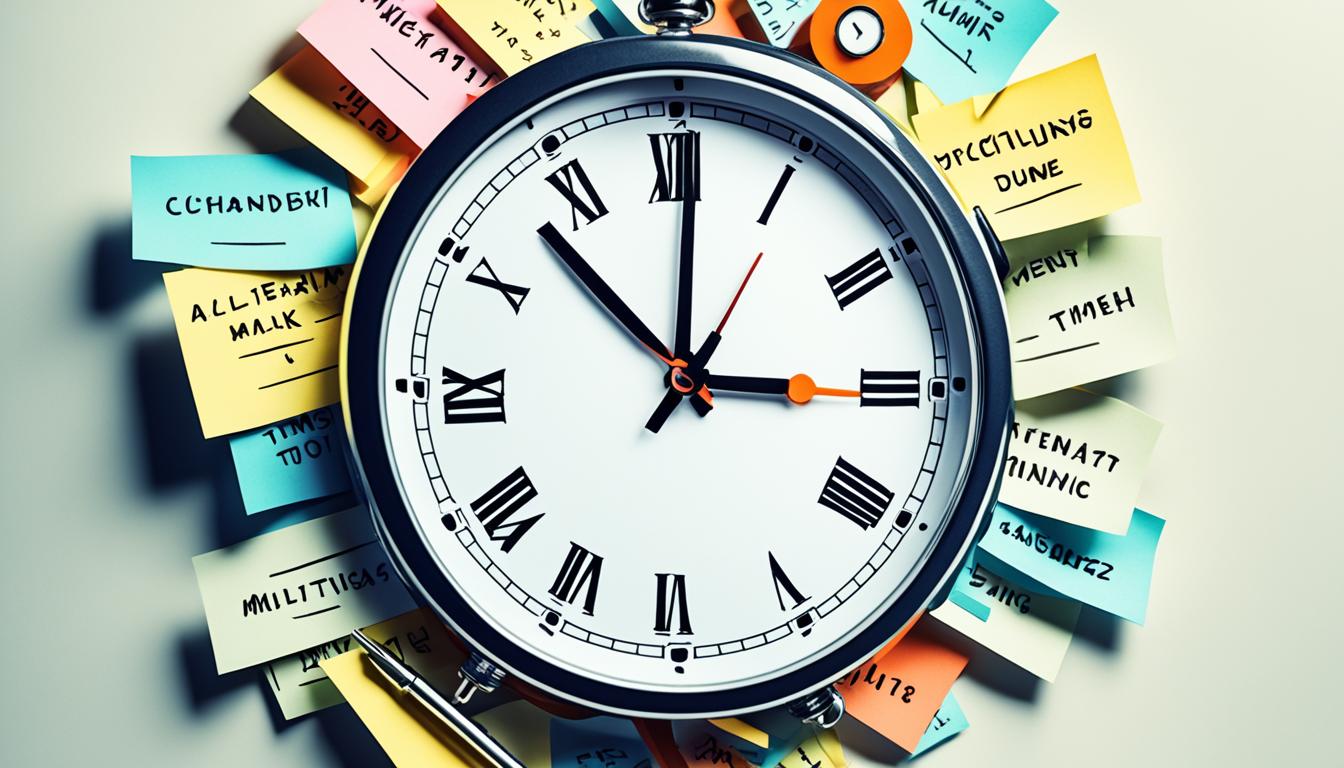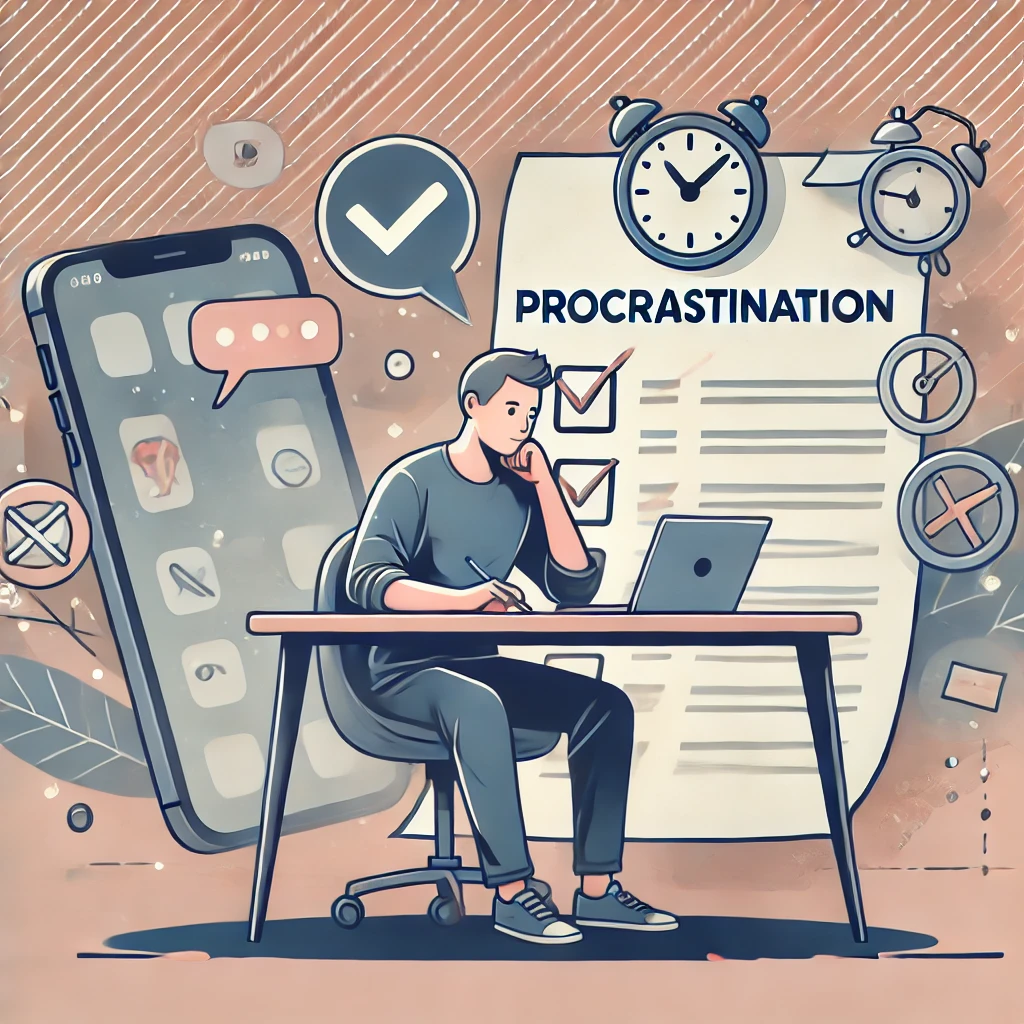
Finishing tasks on time needs smart steps. These steps help us handle deadlines well. It’s key in work and home life to keep things moving. A State of Work report by Slack found 43% of workers struggle with staying motivated. And 29% have trouble keeping focused. Plus, 71% of bosses want their teams to work harder.
Doing many things at once can make us less efficient. This is because when we switch tasks, we can make more mistakes. The American Psychological Association warns about this. Poor time management can lead to missed deadlines and increased stress.
But, if we let machines do some tasks, we can do better than what our managers expect. In the next parts, we’ll go over ways to manage our tasks better. These pointers are meant to help you effectively manage your time, meet important deadlines, and be more productive. They help hit deadlines and do better at work.
Create Bite-Sized Milestones
Turning big goals into smaller steps is key for good goal setting. Breaking projects into manageable tasks and small tasks makes them less overwhelming and easier to start. It makes things easier and helps you see your progress. For example, if you have to write a long report, tackle it bit by bit. This way, you won’t feel overwhelmed and stressed.
Break Down Large Goals
To succeed, it’s important to divide big goals into small bits. This means looking at the tasks and figuring out how to make them doable. If a job takes months, set monthly goals for it. But for something shorter, weekly goals might work better.
It’s also helpful to give each task a set time to finish. This keeps things moving and boosts your efficiency.
Manageability and Motivation
Working on small goals keeps you motivated. It feels good to check off each one. Plus, setting deadlines helps you stay focused and finish the job. Always working hard on your goals ensures they’ll get done.
Using tools like Excel or Asana to keep track can be a game changer. They make staying organized easier and keep your work flow smooth.
Find a Motivating Partner
Pairing up with someone, like a friend or coworker, helps you stay on track. Having a partner can also help you successfully balance multiple responsibilities, such as work, personal life, and other commitments. This is key, especially for tough tasks. It makes missing goals less common and boosts you with encouragement.

Accountability Benefits
Being accountable brings many pluses, says Dr. Jennifer Jacobsen. It makes you strive for goals that are important to you. By setting smaller goals leading to big ones, you’re likely to keep going.
People tend to remember their failures more than successes, studies find. That’s why having a partner to cheer you on is vital. It reminds you of what you’ve achieved, pushing you forward.
Your mental health links closely with how motivated you are. If you’re feeling down, you might lack the urge to push forward. But, partners can push each other to aim higher, boosting goals.
Encouragement is key and it’s proven to work. Studies in behavior show that praising each other is important. It spurs on positive actions, helping both of you reach your goals together.
Sources for Partners
Where to find the right partner for this? Matt Dodson points out how leaders can inspire success at Chevron. Teaming up at work makes things better, both in results and happiness.
Besides, personalized coaching like BetterUp can also help with motivation. Aiming for a team effort and working closely with coaches is smart. This promotes a culture of growth and boosts how valued employees feel.
Letting employees grow and do well on their own is vital. It shows the company supports them. This backing and freedom at work is crucial for reaching team targets in a happy, productive setting.
Keep Track of Your Progress
Checking on your work each day can really boost how much you get done. Tracking your daily tasks and routine tasks helps maintain consistency and organization, making it easier to manage your workload effectively. It helps you see what’s working and what’s not, so you can do better. By tracking your daily wins, you can easily spot problems and fix them. This makes it easier to make smart choices and stay on track with your goals.
Daily Tracking Habits
Do you want to stay focused on your goals? Then, track your progress every day. Spend a little time reviewing what you’ve done and planning your next steps. This simple routine helps mark your wins and shows where you can do better. Apps like RescueTime and MeisterTask make it easier. They keep you from getting too distracted and help you see how far you’ve come.
Tools for Tracking
Lots of apps can help you keep an eye on your progress. Take, for example, Toggl Track. It’s free and easy to use on many devices. Timely is great for big teams because it tracks time for you. Then there’s TrackingTime, good for up to three users for free, or a small fee. Everhour is perfect for small to mid-sized teams. It works well with apps like Asana, Trello, and Jira, making it easy to see how you’re doing and stay organized.
Avoid Planning Loopholes
Strategic planning helps you avoid big problems. It’s important to look at your deadlines and what other people or places need to do. Forgetting things, like when the library is open, can make you miss your goals.

To manage your time well, make goals with the SMART method. This means your goals should be Specific, Measurable, Achievable, Relevant, and Time-bound. Careful planning, sharing tasks, and staying focused stops you from wasting time. It makes you work better and get things done on time.
Good planning gets rid of mistakes, making you ready for problems. Knowing how you work best, whether you like to wait or do things perfectly, helps a lot. Using tools like Pomodoro or Kanban makes work easier. The Pickle Jar theory is another helpful method, as it helps you categorize different aspects of your schedule, such as distractions, delegable tasks, and priority projects, so you can focus on what matters most. They offer breaks and show your jobs clearly so you can focus better.
Not messing up your plans helps you finish things sooner with less worry. You see your progress and feel good about it. This leaves you more time for fun and things you love. It makes your life work well and makes you happy.
Eliminate Distractions
Finding and tackling distractions is vital for working well. Things like social media pings, phone calls, and surprise visits break our focus. Setting up quiet work times and using apps that limit these digital bumps can make you work better.
80% of workers feel these interruptions make them less productive. Task switching between activities, such as answering phone calls or emails, can further reduce productivity.
When you focus on a single task or one task at a time, you can improve your efficiency and the quality of your work. Avoiding multitasking helps minimize distractions and allows for deeper concentration.
Identify Common Distractions
In today’s world, it’s easy to get distracted. Messages from friends, new emails, and unexpected chats at work are everywhere. 80% of workers feel these interruptions make them less productive. Dealing with these distractions is key to staying focused.
Strategies to Minimize Distractions
There are many ways to cut down on distractions and boost how much you get done. Using the Pomodoro Technique can up your productivity by 25%. It breaks your work into focused chunks. Also, ditching unneeded notifications and making a work-only spot can cut down on interruptions. People who juggle their time well, setting goals and taking breaks, see a 30% happier work life and a big increase in focus.
Utilize a Calendar Tool
Using a calendar tool boosts how you organize tasks. Google Calendar is a top choice for many. It helps you set goals for different times, like days or weeks. This makes tasks easier to manage and put in order.
Benefits of Calendar Tools
Calendar tools let you see your tasks in an orderly way. They work well with other apps too, so tasks fit into your schedule better. By splitting your day into scheduled tasks, you can use your time wisely. Google Calendar is a top choice for many. Using a calendar app can help students and professionals remember important deadlines and stay organized.
It’s great for deciding what tasks are most important. Plus, you can end up with more free time if you do it right. Then, you can focus on the big tasks that need to get done.

Integration with Other Tools
The best part about calendar tools? They can work with other apps for even more help. You can sort tasks however you need. Tasks that are most important can get scheduled first.
It’s important to look over your tasks each week. This way, nothing important gets overlooked. By adding in breaks, you can handle any surprises that come up while staying productive. This article on using a calendar instead of a to-do list is worth checking out for more tips on getting things done.
For making your tasks a priority, try using the urgency-importance matrix. Time-blocking is another good strategy. It’s great for focusing on important tasks without distractions. Doing this right can leave you with more time for yourself. For more advice, see how to use a calendar and a task manager together for better productivity.
Set a Soft Deadline
Setting an early deadline can help avoid last-minute problems. It lets you deal with unexpected happenings like sickness or tech troubles without getting behind. By building in buffer time with early deadlines, you reduce the risk of missed deadlines caused by poor planning or unforeseen distractions.
This approach keeps you focused and productive. It stops putting things off because the early deadline feels urgent but not overwhelming. Different people do better with different deadlines. For some, soft deadlines suit them best because it matches their way of working.
Finding the right deadline strategy is key. It’s good to experiment with deadlines to see what helps you get things done. Sometimes, a soft deadline can show you the real hard deadline, making your work more effective.
Avoid Procrastination
Procrastination makes it hard to meet deadlines. It happens when tasks seem too hard, lack rewards, or stress you out. About 20% of adults and 70% of college students often put things off. Knowing why can help fight this habit. Poor time management skills often lead to procrastination, making it even harder to finish tasks on time.
Try breaking big jobs into smaller steps, set clear goals, and reward yourself for progress. Even pairing enjoyable things with work can keep you going. Overcoming procrastination can help you save time and complete tasks more efficiently.

Reasons for Procrastination
People procrastinate for many reasons. Stress, feeling down, low confidence, and the struggle to say no to impulses play a part. We tend to choose what makes us happy now over what’s good for us later. This choice makes our present and future selves not agree.
Two-thirds of people who put off work do so because they want it to be perfect. This could be hurting their progress. Also, only a quarter of workers understand how their duties help the company. This misunderstanding can make procrastination worse.
Techniques to Combat Procrastination
There are lots of ways to stop procrastinating. Good time management is key. Setting small goals and clear steps to reach them makes tasks feel more doable. Rewards are better motivators than punishments.
It can also help to imagine how good it will feel to finish. Or, start with the easiest part of the task. Think about and dismiss thoughts that slow you down. Starting somewhere, no matter how small, is sometimes all it takes to get going.
Having actual consequences for not finishing on time could also work. Or, making promises to yourself and sticking to them. A friend or a group checking on you can keep you on track. And lastly, pairing enjoyable things with work can keep you going.
Conclusion
This guide gives you many tips to finish tasks on time. Good time management is key to being more productive and happy. You should break big tasks into smaller parts to keep your motivation up. Use tools like calendars and apps to help you stay on schedule.
Having someone to cheer you on can make a big difference. They make sure you’re doing what you need to. Keep track of your progress every day to see if you’re staying on course. Try to work when you’re most productive and cut down on time wasters like too much social media.
Try not to do everything yourself. Giving some tasks to others can save you time. This lets you focus on what’s really important. Delegating tasks can also help you protect your personal time and reduce stress. In short, managing your time well involves setting goals, deciding what’s most important, and not putting things off.
These tips can help you use your days wisely, be less stressed, and get more done. Managing your time well can also help you improve productivity, work smarter, and have more energy for your personal life. By following these ideas, you’ll make your personal and work life better. So, start today and see the positive changes in your life.
FAQ
What are some effective time management tips to ensure tasks are completed on time?
Breaking tasks into smaller parts and setting soft deadlines can help. Use tools like Google Calendar to plan. Tracking daily progress makes it easier to meet deadlines.
How can breaking down large goals help in completing tasks on time?
Breaking big goals into smaller steps makes the work easier. It keeps you motivated. You avoid putting things off and keep moving towards your goal.
Why is having a motivating partner important for meeting deadlines?
A partner who motivates you offers accountability. They make sticking to deadlines easier. You’re less likely to miss targets with their support.
What are some tools for tracking progress?
Apps like MeisterTask help track your daily work. They show your progress visually. This makes it easier to see what’s left to do.
How can one avoid planning loopholes that may affect task completion?
To avoid planning mistakes, think about possible problems. Consider external factors and complications. Planning well decreases the chances of missing deadlines.
What are common distractions and how can they be minimized?
Social media alerts and unexpected guests are common distractions. Avoid them by working without interruptions. Some apps help block digital distractions.
What are the benefits of using calendar tools for task management?
Tools like Google Calendar are great for organizing your time. They provide a way to see your tasks and deadlines visually. They can also work with other management tools.
How does setting a soft deadline help in managing time effectively?
Setting an early deadline gives time for any surprises. It helps you finish before the actual due date. This also accounts for life’s unexpected events.
What are some techniques to combat procrastination?
To fight procrastination, break tasks into small steps. Reward yourself for completing each step. Set goals that are doable. These steps keep you going without delay.

More Posts
10 Daily Habits That Will Change Your Life
Step into the daily routines of successful people, and you’ll see a pattern—habits. Benjamin Franklin famously said, “Early to bed and early to rise makes a man healthy, wealthy, and wise.” But is...
10 Ways to Implement Continuous Improvement in the Workplace
It's key for any business to focus on getting better. This helps make the workplace more efficient and encourages new ideas. By making things better, companies can make customers happier and do better...
Top 8 must-have skills for every Entrepreneur
Every entrepreneur is a leader, and leadership roles are highly demanding. There is always a host of expectations to meet and a tremendous amount of pressure to handle. This is especially true for...
Top 10 Time Management Tips for Lawyers
Lawyer time management is key for those who want to work more efficiently in the legal profession. Strong time management skills help professionals stay organized, meet deadlines, and complete critical tasks without unnecessary...